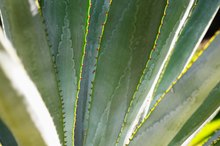An Allergy to Stevia
Stevia, a natural sweetener native to South America, is a plant much sweeter than sugar and considered to be beneficial for many health conditions, including obesity and hypertension. Stevia was approved for sale as a sweetener in the United States in 2008. However, stevia may cause allergic reactions in some people.
Oral Allergy Syndrome
Oral allergy syndrome is a condition where the body mistakes proteins in fresh fruits and vegetables as pollen, which causes the immune system to react. If you are allergic to ragweed, there is a possibility you may have an oral allergic reaction to stevia. Other foods that may cause a reaction include bananas, watermelon and other melons, zucchinis, tomatoes and sunflower seeds. Symptoms can include swelling and itching of the lips, mouth, tongue and throat, hives, abdominal pain, nausea, vomiting and a tingling sensation in the mouth and throat.
- Oral allergy syndrome is a condition where the body mistakes proteins in fresh fruits and vegetables as pollen, which causes the immune system to react.
- If you are allergic to ragweed, there is a possibility you may have an oral allergic reaction to stevia.
Hay Fever Connection
Allergy to Cane Sugar, Not Refined Sugar
Learn More
If you do not know if you have an allergy to ragweed and are worried about a reaction to stevia, determine if you suffer from hay fever. Hay fever is caused by ragweed, and is at its peak from August to October from the east coast to the midwest of the United States. Symptoms include itchy, watery eyes, sneezing and a runny nose. If you have these reactions to ragweed, exercise caution when using stevia until you know how your body reacts.
- If you do not know if you have an allergy to ragweed and are worried about a reaction to stevia, determine if you suffer from hay fever.
- If you have these reactions to ragweed, exercise caution when using stevia until you know how your body reacts.
Prevention
The best way to prevent an allergic reaction to stevia is to avoid using stevia. Many substitute sweeteners are available on the market. If you prefer a natural sweetener, reconsider your use of sugar, or look into using honey or agave nectar. Immunotherapy, or allergy shots, may also be an option for preventing severe allergic reactions to stevia. Talk to your doctor or an allergy specialist about immunotherapy for stevia allergies.
- The best way to prevent an allergic reaction to stevia is to avoid using stevia.
- If you prefer a natural sweetener, reconsider your use of sugar, or look into using honey or agave nectar.
Treatment
Side Effects of Using Agave Syrup
Learn More
There are limited treatments for oral allergies to stevia. If you have a mild allergic reaction, such as hives, a runny nose, or mild tingling or swelling in your lips, an over-the-counter antihistamine can help relieve your symptoms. If you have a more severe reaction, such as severe facial swelling or anaphylaxis – symptoms include difficulty breathing, severe drop in blood pressure, or dizziness or loss of consciousness – treatment includes an emergency injection of epinephrine and emergency medical care. If you suffer allergic reactions to stevia, talk to your doctor or allergy specialist about emergency epinephrine injectors.
- There are limited treatments for oral allergies to stevia.
- If you have a mild allergic reaction, such as hives, a runny nose, or mild tingling or swelling in your lips, an over-the-counter antihistamine can help relieve your symptoms.
Related Articles
References
- Raintree Nutrition: Tropical Plant Database: Stevia rebaudiana
- US Food and Drug Administration; Agency Response Letter GRAS Notice No. GRN 000253; December 2008
- The Children’s Hospital of Philadelphia: Oral Allergy Syndrome
- American Academy of Allergy, Asthma & Immunology: Ragweed Plants Packed with Pollen
- Giuffre L, Romaniuk R, Ciarlo E. Stevia, ka'a he'e, wild sweet herb from South America - An overview. Emir J. Food Agric. 2013;25(10):746-750. doi:10.9755/ejfa.v25i10.16405
- USDA. Stevia. Updated April 2019.
- Tandel KR. Sugar substitutes: Health controversy over perceived benefits. J Pharmacol Pharmacother. 2011;2(4):236–243. doi:10.4103/0976-500X.85936
- Regnat K, Mach RL, Mach-Aigner AR. Erythritol as sweetener-wherefrom and whereto?. Appl Microbiol Biotechnol. 2018;102(2):587–595. doi:10.1007/s00253-017-8654-1
- Samakkarnthani P, Payanundana M, Sathavarodom N, Siriwan C, Boonyavarakul A. Effect of stevia on glycemic and insulin responses in obese patients - A randomized, double-blind, placebo-controlled crossover study. Diabetes. 2018;67(Suppl 1). doi:10.2337/db18-790-P
- Dyrskog SE, Jeppesen PB, Chen J, Christensen LP, Hermansen K. The diterpene glycoside, rebaudioside A, does not improve glycemic control or affect blood pressure after eight weeks treatment in the Goto-Kakizaki rat. Rev Diabet Stud. 2005;2(2):84–91. doi:10.1900/RDS.2005.2.84
- Ashwell M. Stevia, Nature's zero-calorie sustainable sweetener: A new player in the fight against obesity. Nutr Today. 2015;50(3):129–134. doi:10.1097/NT.0000000000000094
- USDA. Has Stevia been approved by FDA to be used as a sweetener?. Updated March 2018.
- Nunes AP, Ferreira-Machado SC, Nunes RM, Dantas FJ, De Mattos JC, Caldeira-de-Araújo A. Analysis of genotoxic potentiality of stevioside by comet assay. Food Chem Toxicol. 2007;45(4):662–666. doi:10.1016/j.fct.2006.10.015
- American Academy of Allergy Asthma & Immunology. Allergic reactions to stevia, sucralose. Updated April 29, 2019.
- Kimata H. Anaphylaxis by stevioside in infants with atopic eczema. Allergy. 2007;62(5):565–566. doi:10.1111/j.1398-9995.2007.01317.x
Writer Bio
Laura Wright started writing professionally in 2010. She has worked with women's health issues and gender-based violence, and as a research associate on human rights with The Protection Project. She earned both a Bachelor of Arts in sociology and anthropology and a Master of Public Health from West Virginia University.









